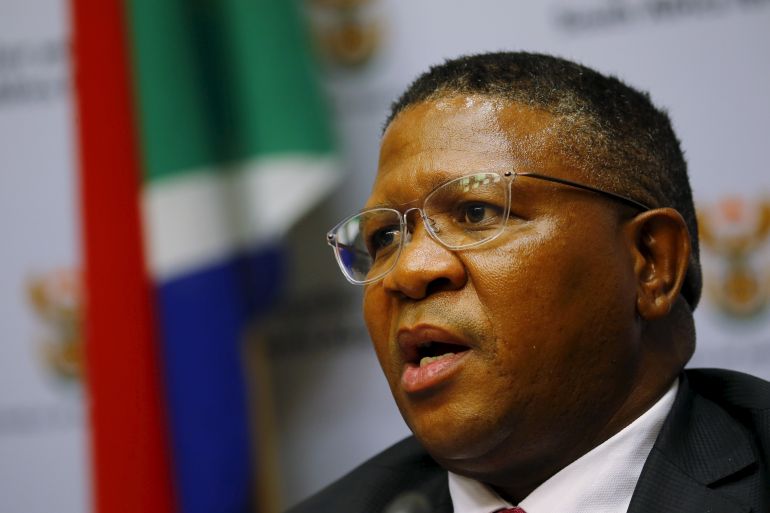S African minister suggests foreigners are to blame for no jobs
The high unemployment rate in South Africa has led to locals often blaming foreigners for taking jobs ‘meant’ for them.

Fikile Mbalula, South Africa’s transport minister, has suggested that “Pakistanis and illegal foreigners” are a contributing factor to high unemployment in the country.
Mbalula was responding to questions at a South African Youth Economic Council (SAYEC) conference on Wednesday when one speaker confronted him about the country’s lack of job opportunities for the youth.
Keep reading
list of 4 itemsCyprus suspends asylum applications for Syrians as arrivals rise
Agadez, Niger’s gateway to the Sahara, finds new life in the migrant trade
Forced from home, these Colombians struggle to live in a basketball stadium
“He sold his shop to the Pakistanis because he couldn’t compete with them,” Mbalula told the crowd, explaining that his uncle had to sell his shop because Pakistani nationals were selling goods and products at a cheaper price.
He said there was a need to interrogate where Pakistani nationals were getting their supply to be able to sell cheaply.
According to Stats South Africa, the overall unemployment rate in South Africa is 35 percent, with youth constituting more than half of that figure. This has frequently led to conflict between immigrants and groups of South Africans who blame foreign nationals for taking jobs and businesses supposedly meant for the locals.
For years, intergenerational protests have erupted throughout the country, with frustrations about unemployment, crime, and poor service delivery frequently spilling over onto foreign nationals.
Mbalula, a former police minister, went on to accuse Pakistani nationals of being “the biggest loan sharks around. “They’ve got an open book and they loan you and your whole pension is going to the Pakistanis. You can even loan up to R500. Your whole pension is going to the Pakistanis every month,” he said.
The SAYEC event took place on the eve of nationwide commemorations of the Soweto Uprising. This year marks the 46th anniversary of the Soweto Uprising, an anti-apartheid uprising led by black students in Johannesburg’s Soweto township on June 16, 1976.
The protests turned deadly when apartheid police opened fire on the students, killing an estimated 174 people and injuring hundreds. They soon spread across South Africa, becoming one of the biggest acts of defiance against the apartheid system.
‘Reckless’ and ‘xenophobic’
Sharon Ekambaram, head of refugee and migrant rights programme at Lawyers for Human Rights (LHR) had called Mbalula’s comments reckless and a result of political impunity enjoyed by leaders of the ruling party, the African National Congress (ANC).
“The South African Human Rights Commission issued findings from their investigations of xenophobia and made very clear recommendations to hold officials accountable. The fact that a minister can make these reckless statements in 2022 demonstrates that the commission failed to implement its recommendations,” she said.
“The minister has the ability to make rash public statements that fuel the rhetoric of organisations like Operation Dudula and vigilantism.”
Words like Mbalula’s, according to Sindiswe Ndaba, a student at the University of the Witwatersrand who attended the conference, are leading to more young people are joining vigilante groups like Operation Dudula.
“For 28 years, the ANC has been deflecting. Our socioeconomic issues are always the fault of other people and there is never any accountability from them,” she said.
“You are the minister, you have the power to do something if you believe foreign nationals are taking opportunities from us, and yet you choose to go on a tirade and leave us without any concrete solutions for unemployment,” the economics student continued.
When contacted for further clarification, Mbalula said he stood by his words and denied that there was any xenophobic intent.
Mbalula claimed his statements were not xenophobic, “It is a problem in terms of local economy,” he said. “The business of spaza shops that used to belong to our people have been taken over by Pakistanis. They can no longer survive and have no option but to surrender.”
According to a 2015 report from a committee on migration and communal integration setup by the KwaZulu Natal provincial government, inflammatory public statement statements by political leaders and dissemination of misinformation on social media can be enough to encourage armed mobs against immigrants.
The challenging rhetoric and lack of proactive communications contributed to tensions simmering amongst local communities,” the report said.
In April, an anti-immigrant vigilante group killed a 44-year-old undocumented Zimbabwean national, Elvis Nyathi.
Nyathi’s death, according to Ekambaram, could have been a direct result of reckless statements.
“In a country where collective violence is rampant and people feel empowered to take the law into their own hands, if the minister discovers that someone is breaking the law, regardless of nationality, the law must take its place,” she said.
“These messages have a dangerous resonance with young people who are desperate for opportunities and feel deprived. When the truth is that the government is simply failing to implement policies that are intended to benefit Africans and youth.”
According to Ekambaram, her organisation will lodge a complaint with the South African Human Rights Commission.
The ANC Youth League did not respond to requests for comments.